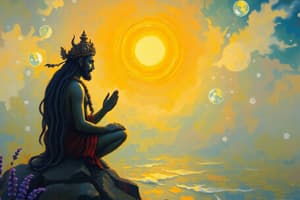Podcast
Questions and Answers
Welke filosoof ontwikkelde een monistisch alternatief voor de dualistische verklaring van cosmos en mens?
Welke filosoof ontwikkelde een monistisch alternatief voor de dualistische verklaring van cosmos en mens?
- Nagarjuna
- Herakleitos
- Confucius
- Shankara (correct)
Wat beschrijft de analogie van de onverlichte wandelaar en de slang?
Wat beschrijft de analogie van de onverlichte wandelaar en de slang?
- De noodzaak van samenwerking
- De vergankelijkheid van materie
- De angst voor onbekende situaties
- De illusie van dualiteit (correct)
Wat is het hoogste ideaal dat Confucius nastreeft binnen zijn filosofie?
Wat is het hoogste ideaal dat Confucius nastreeft binnen zijn filosofie?
- Zelfbeheersing
- Rechtvaardigheid
- Wijsheid (correct)
- Deugdzaamheid
Hoe verschilt Mencius' opvatting over de mens van die van Xunzi?
Hoe verschilt Mencius' opvatting over de mens van die van Xunzi?
Wat beschrijft het centrale toepassingsdomein binnen het confucianisme?
Wat beschrijft het centrale toepassingsdomein binnen het confucianisme?
Wat is een belangrijk aspect van het taoïsme?
Wat is een belangrijk aspect van het taoïsme?
Wat stelt Ban Zhao voor met betrekking tot meisjesonderwijs?
Wat stelt Ban Zhao voor met betrekking tot meisjesonderwijs?
Welke concepten zijn volgens Nagarjuna voortdurend ontoereikend?
Welke concepten zijn volgens Nagarjuna voortdurend ontoereikend?
Wat is een centraal principe in de filosofie van Zhuang Zi?
Wat is een centraal principe in de filosofie van Zhuang Zi?
Wat wordt als de oorsprong van lijden in de boeddhistische filosofie gezien?
Wat wordt als de oorsprong van lijden in de boeddhistische filosofie gezien?
Wat situeert de basis van het Japanse zenboeddhisme?
Wat situeert de basis van het Japanse zenboeddhisme?
Wat is de einddoelstelling in de vedische traditie dat de mens kan bereiken?
Wat is de einddoelstelling in de vedische traditie dat de mens kan bereiken?
Welke term beschrijft het concept van 'niet-doen' in de filosofie van Zhuang Zi?
Welke term beschrijft het concept van 'niet-doen' in de filosofie van Zhuang Zi?
Welke filosofie legt nadruk op de eenheid van Atman en Brahman?
Welke filosofie legt nadruk op de eenheid van Atman en Brahman?
Wat beschouwt Kanetomo als essentieel voor het bijdragen aan de universele orde?
Wat beschouwt Kanetomo als essentieel voor het bijdragen aan de universele orde?
Welke uitspraak over Zhuang Zi is juist?
Welke uitspraak over Zhuang Zi is juist?
Wat biedt de Vedische traditie aan als een middel tot het overstijgen van lijden?
Wat biedt de Vedische traditie aan als een middel tot het overstijgen van lijden?
Wat zijn de Vier Edele Waarheden in de boeddhistische filosofie?
Wat zijn de Vier Edele Waarheden in de boeddhistische filosofie?
Wat maakt de leer van Dōgen bijzonder binnen het zenboeddhisme?
Wat maakt de leer van Dōgen bijzonder binnen het zenboeddhisme?
Welke van de volgende concepten wordt niet aan de boeddhanatuur toegeschreven binnen het chanboeddhisme?
Welke van de volgende concepten wordt niet aan de boeddhanatuur toegeschreven binnen het chanboeddhisme?
Wie wordt beschouwd als de stichter van het boeddhisme?
Wie wordt beschouwd als de stichter van het boeddhisme?
Wat is de belangrijkste boodschap van de eerste Edele Waarheid?
Wat is de belangrijkste boodschap van de eerste Edele Waarheid?
Wat betekent shintoïsme letterlijk?
Wat betekent shintoïsme letterlijk?
Welke filosofie legt de nadruk op 'woordeloze ervaring' van de geestelijke werkelijkheid?
Welke filosofie legt de nadruk op 'woordeloze ervaring' van de geestelijke werkelijkheid?
Wat is volgens de vierde Edele Waarheid noodzakelijk om het lijden te beëindigen?
Wat is volgens de vierde Edele Waarheid noodzakelijk om het lijden te beëindigen?
Welke opvatting hebben hinayanafilosofen over de mens?
Welke opvatting hebben hinayanafilosofen over de mens?
Wat is het ideaal van de bodhisattva in het mahayanaboeddhisme?
Wat is het ideaal van de bodhisattva in het mahayanaboeddhisme?
Wat stelt Nagarjuna over de concepten die we gebruiken?
Wat stelt Nagarjuna over de concepten die we gebruiken?
Wat betekent het bij Nagarjuna om het hokjesdenken los te laten?
Wat betekent het bij Nagarjuna om het hokjesdenken los te laten?
Hoe verhoudt het ideaal van de arhat zich tot dat van de bodhisattva?
Hoe verhoudt het ideaal van de arhat zich tot dat van de bodhisattva?
Wat is een belangrijk kenmerk van nirvana volgens Boeddha?
Wat is een belangrijk kenmerk van nirvana volgens Boeddha?
Wat criticeert Boeddha over filosofen in zijn vergelijking met blinde mensen?
Wat criticeert Boeddha over filosofen in zijn vergelijking met blinde mensen?
Flashcards
De Vierde Edele Waarheid
De Vierde Edele Waarheid
De vierde en laatste Edele Waarheid van het boeddhisme beoogt een praktisch pad te beschrijven om het lijden te beëindigen.
Het Achtvoudige Pad
Het Achtvoudige Pad
Het Achtvoudige Pad is een reeks ethische richtlijnen en mentale trainingen die leiden tot verlichting
Nirvana
Nirvana
Volgens het Boeddhisme is het Nirvana de toestand van bevrijding van het lijden en de cyclus van wedergeboorte.
Hinayana-boeddhisme
Hinayana-boeddhisme
Signup and view all the flashcards
Mahayanaboeddhisme
Mahayanaboeddhisme
Signup and view all the flashcards
Nagarjuna
Nagarjuna
Signup and view all the flashcards
De leegte
De leegte
Signup and view all the flashcards
Substanties
Substanties
Signup and view all the flashcards
Wat zijn de Upanishads?
Wat zijn de Upanishads?
Signup and view all the flashcards
Wat is Brahman?
Wat is Brahman?
Signup and view all the flashcards
Wat is samsara?
Wat is samsara?
Signup and view all the flashcards
Wat is Atman?
Wat is Atman?
Signup and view all the flashcards
Wat is moksha?
Wat is moksha?
Signup and view all the flashcards
Wat is de eerste Edele Waarheid?
Wat is de eerste Edele Waarheid?
Signup and view all the flashcards
Wat is de tweede Edele Waarheid?
Wat is de tweede Edele Waarheid?
Signup and view all the flashcards
Wat is de derde Edele Waarheid?
Wat is de derde Edele Waarheid?
Signup and view all the flashcards
Shankara's monisme
Shankara's monisme
Signup and view all the flashcards
Confucius' idealen
Confucius' idealen
Signup and view all the flashcards
Confucius' visie op bestuur
Confucius' visie op bestuur
Signup and view all the flashcards
Confucius' standpunt over de gewone mens
Confucius' standpunt over de gewone mens
Signup and view all the flashcards
Mencius vs. Xunzi
Mencius vs. Xunzi
Signup and view all the flashcards
Taoïsme
Taoïsme
Signup and view all the flashcards
Taoïsme: Leven in Harmonie met de natuur
Taoïsme: Leven in Harmonie met de natuur
Signup and view all the flashcards
Confucianisme vs. Taoïsme
Confucianisme vs. Taoïsme
Signup and view all the flashcards
Wuwei
Wuwei
Signup and view all the flashcards
Zhuang Zi
Zhuang Zi
Signup and view all the flashcards
Chanboeddhisme
Chanboeddhisme
Signup and view all the flashcards
Verlichtingservaring
Verlichtingservaring
Signup and view all the flashcards
Dōgen
Dōgen
Signup and view all the flashcards
Shintoïsme
Shintoïsme
Signup and view all the flashcards
Yin en Yang
Yin en Yang
Signup and view all the flashcards
Mens als microkosmos
Mens als microkosmos
Signup and view all the flashcards
Study Notes
De Vedische Traditie
- The Upanishads are considered the foundation of Hinduism.
- Schopenhauer viewed the Upanishads as a source of wisdom and solace in life and death.
- Reincarnation is a key concept, where actions (karma) determine future lives.
- Liberation (moksha) is achieved through self-realization.
- Atman (individual soul) and Brahman (ultimate reality) are closely linked.
- Suffering is a natural consequence of existence and cycle of rebirth, which the Upanishads detail.
Boeddha
- Buddha's teachings emphasizes liberation from suffering.
- The Four Noble Truths are central to his philosophy: suffering exists, suffering has a cause, suffering can cease, and there is a path to the cessation of suffering
- The Eightfold Path outlines practical steps to overcome desire and attachment and to find enlightenment
- Nirvana: the ultimate goal of liberation from the cycle of rebirth and suffering.
- The concept of self is questioned and negated in Buddha's philosophy.
Nagarjuna and Mahayana Buddhism
- Nagarjuna, a prominent Mahayana Buddhist, stressed the concept of emptiness.
- Comparing Nagarjuna to apofatic theology
- Nagarjuna criticized the concept of independent existence of things.
- Bodhisattva ideal: seeking enlightenment for all beings rather than for oneself.
Shankara and Hindu Philosophy
- Shankara posited a monistic view, emphasizing Brahman as the ultimate reality.
- Liberation is attainable through meditation focusing on Brahman, even with attributes.
- Analogies of a traveler mistaken for a snake or swimmers counting others but not themselves highlight the limitations of ordinary perception and the importance of recognizing one's own ignorance for enlightenment.
Confucius and Confucianism
- Confucianism emphasizes moral qualities and social harmony.
- The concept of becoming a "wise" person is a high goal.
- Confucius believed that social hierarchy is essential for societal stability.
- Mencius (on good and flawed nature of man) and Xunzi (on human nature as flawed) vary in their perspectives.
- Women's education (Ban Zhao) is relevant to the path of human development
- Cultivating virtue is central to the path of a virtuous person
Lao Zi, Zhuang Zi, and Taoism
- Taoism, meaning "The Way", emphasizes naturalness and spontaneity.
- Non-action (wuwei) is a key concept.
- The Tao represents the natural order and the principle of the universe.
- Zhuang Zi emphasized the limitations of human understanding, encouraging spontaneous and non-judgmental action.
Chan Buddhism
- Chan Buddhism, the basis of Japanese Zen, emphasizes experiential enlightenment.
- Focus on intuitive understanding and direct experience.
- Rejecting the idea of grasping through concepts.
Shintoism
- Shinto is the "way of the Gods."
- The concept of the divine encompassing cosmic forces, such as Yin and Yang (similar to Taoist concepts) provides further structure and meaning to the worldview.
- Shinto emphasizes harmony between humans and nature, and the proper honoring of the gods.
Dogen's Zen Buddhism
- Dogen was a significant figure in Japanese Zen Buddhism.
- Emphasizes the practice of zazen (seated meditation).
- Focus on achieving enlightenment through continuous effort and acceptance of impermanence.
Studying That Suits You
Use AI to generate personalized quizzes and flashcards to suit your learning preferences.





